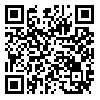BibTeX | RIS | EndNote | Medlars | ProCite | Reference Manager | RefWorks
Send citation to:
URL: http://ioh.iums.ac.ir/article-1-1155-en.html
Background and aims: The main objective of this research was finding the relations between musculoskeletal disorders and depression and anxiety (overt and covert) in emergency staff of hospitals covered by Shahid Beheshti University of Medical Sciences.
Methods: The research was descriptive- analytical study. Out of 600 staff of hospitals covered by Shahid Beheshti University of Medical Sciences, 120 were selected randomly as sample group in 2012. Socio-demographic, Nordic Musculoskeletal Disorders, CES-D and Schpillberger anxiety scales were applied as research tools. SPSS19 software and statistical techniques such as t-test, Pearson correlation coefficient, and one- way ANOVA were employed for analyzing the data.
Results: Depression was lower and anxiety was upper than average amounts. There was significant relationship between depression and musculoskeletal disorders. Also, there was a significant difference in depression with respect to job title and educations. There were not observed such differences in overt and covert anxiety among staff. Staff with contract recruitment were suffering from depression more than other groups. It was found significant relationship between depression and anxiety, also overt and covert anxiety.
Conclusion: The overt and covert anxiety of emergency staff is in the high level in order to the harmful nature of their jobs. Emergency managers and physicians have lower depression in comparison with other groups because of their low physical pressure. Further to the stressful nature of emergency job without concerning the job position, whole of the staff have high overt and covert anxiety.
Received: 2013/12/19 | Accepted: 2015/01/5 | Published: 2015/06/15
| Rights and permissions | |
 |
This work is licensed under a Creative Commons Attribution-NonCommercial 4.0 International License. |





